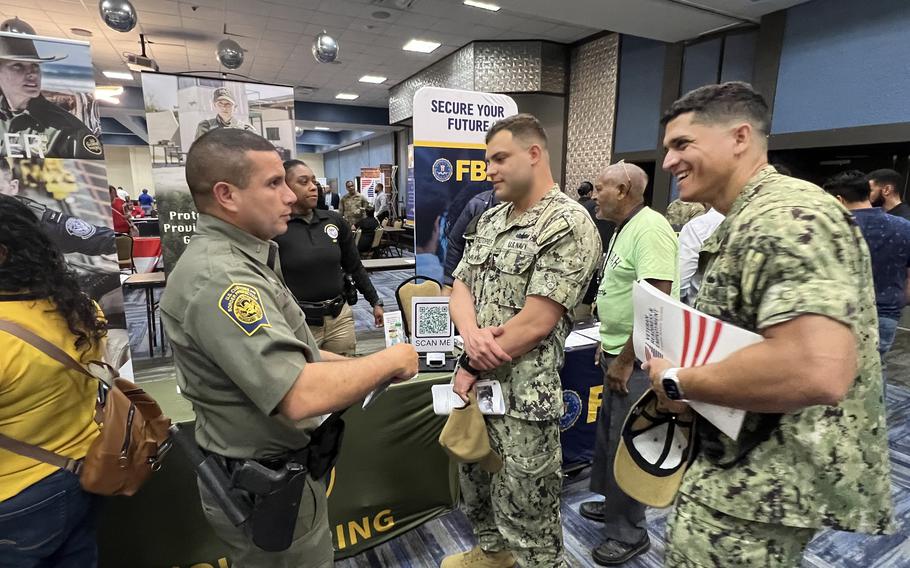
Hundreds of service members, civilians, families and members of the community gathered in June 2024 to participate in a hiring and education fair organized by the Transition Assistance Program at Fort Buchanan in Puerto Rico. (U.S. Army)
WASHINGTON — Easing some of the challenges that service members encounter as they seek advanced education, home loans and job training after military service were addressed in a series of bills presented at a House hearing on economic opportunities for veterans.
Rep. Derrick Van Orden, R-Wis., chairman of the economic opportunity subpanel for the House Veterans’ Affairs Committee, emphasized at the start of a two-hour hearing Wednesday the importance for lawmakers to understand how well the mandatory Transition Assistance Program is preparing service members for civilian life.
Run by the Defense Department, TAP is required classroom education for service members in their final months of military duty. TAP offers information for understanding benefits and services offered through the Department of Veterans Affairs.
VA Secretary Doug Collins and Defense Secretary Pete Hegseth signed an agreement in late May to partner and collaborate more on providing a continuum of support for troops as they leave the military.
But the purpose of the hearing was to discuss legislation for improving delivery of some key VA benefits to service members after the leave the military. The dozen bills presented focused on VA benefit programs for tuition, job training and home loans.
Among the bills were efforts to increase monthly housing assistance for veterans enrolled at online colleges and establish a database to help disabled veterans in their search to buy adaptive homes.
“This is a simple, common-sense solution,’’ said Kimberlyn King-Hinds, Republican delegate from the Northern Mariana Islands, an at-large congressional district.
King-Hinds referred to the HOMES Act, which she leads with Van Orden.
The bill would provide financial counseling for any veteran buying a house but also create a centralized online list of homes for sale that have been specially adapted for people in wheelchairs and with severe disabilities.
Van Orden also expressed his appreciation to the Defense Department for sending a representative to the hearing to discuss recent changes for improving TAP and better coordinating support with VA for transitioning service members.
Liz Clark, acting director of the Defense Support Services Center at DOD, discussed efforts to enhance the TAP program and partner with the VA to provide a “common level” of support for the roughly 200,000 service members who leave the military each year.
“TAP is markedly different and exponentially more effective than the program of 10, five or even three years ago,” she said.
Veterans have complained TAP provides a large amount of information often without context. They have asked for more one-on-one counseling and classroom courses tailored to specific needs.
Van Orden said certain military branches “are doing TAP better than others.”
“Service members leaving these successful branches will show others the value of military service. They are the best tool we have for recruitment,” he said.
Van Orden discussed his legislation called the Enhancing the Transitioning Servicemember’s Experience Act. The bill would require data to be collected on veterans’ experiences with TAP.
“We need to have a better understanding of how we are preparing our military members and their families for civilian life,” he said.
Another bill led by Van Orden called the Refinancing Relief for Veterans Act would reduce the fee for veterans using an interest rate reduction refinance loan, or IRRRL.
Offered by the VA, the loan allows veterans and service members to refinance their VA-backed mortgages to a lower interest rate, which can potentially lower monthly payments and reduce the total loan cost.
Lawmakers also heard about plans to reintroduce the Expanding Access for Online Veteran Students Act, which did not advance in 2023.
The bill would increase the housing allowance for veterans who pursue education through online learning. The new legislation, which is still in draft form, would seek to eliminate the disparity in benefits provided to in-person and online students.
Rep. Abe Hamadeh, R-Ariz., discussed the Edith Nourse Rogers STEM Scholarship Opportunity Act, which would modify some of the eligibility requirements to be considered for the scholarship.
The scholarship provides educational assistance to veterans pursuing degrees in science, technology, engineering and mathematics.
The legislation would remove the requirement that veterans must be close to exhausting benefits from their post-9/11 GI Bill or Fry Scholarship before applying.
Hamadeh said 3,500 veterans have benefitted from the scholarship in the three years that it has been offered.
“We need more homegrown talent ready to fill these roles,” said Hamadeh, a former Army intelligence officer. “As a veteran, I know how important opportunities like those provided in this program are to the men and women who have sacrificed so much for our nation.”